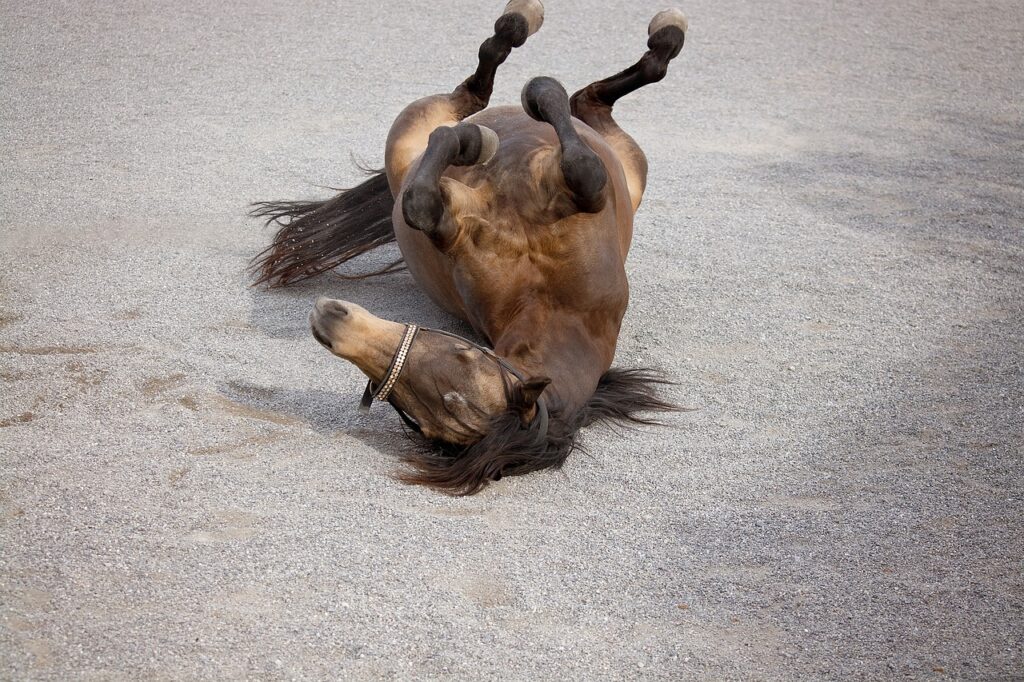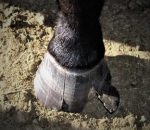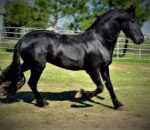Colic in horses is a very common condition. The word “Colic” means abdominal pain. This term is associated with a number of clinical conditions that exhibit the signs of abdominal pain/ visceral pain.
Types of Colic in Horses
The Equine colic is broadly classified into 5 types.
- Spasmodic Colic
- Impaction Colic
- Obstructive Colic
- Gas Colic ( Flatulent colic)
- Idiopathic Colic
Spasmodic Colic
This type of colic develops due to increasing bowel motor activity and the signs of pain are acute to peracute and intermittent type i.e. wax and wane at frequent intervals.
Impactive Colic
This type of colic develops when bowel lumen is much distended and its motility is reduced due to impaction of bowel with dry, partial digested feed contents. The signs of pain are sub-acute and continuous type.
Obstructive Colic
In this type of colic the passage of ingesta is obstructed by major injuries to the bowel, the lumen of the intestine (e.g., torsion, intussusception, strangulation, or paralytic ileus). This condition can also result from obstruction in the vascular supply to any segment of the intestines due to a variety of causes. The pain is continuous and usually acute to peracute in nature.
Gas Colic / Flatulent Colic / intestinal tympany
This type of colic develops because of over-distension of bowel lumen due to accumulation of gases, yielding pain of acute and continuous type.
Idiopathic Colic
In this type of colic, there may be no obvious cause or lesions even established at laparotomy to account for the development of pain experienced by the horse.

Causes of Colic in Horses/ Equine Colic
The etiology or cause of colic is broadly categorized as
A. Colic with G.I tract origin
B. Colic originating from other organs (False Colic)
Intestinal , cecal or colonic tympany causes flatulent colic. Intestinal hypermotility and muscle spasms cause spasmodic colic. Impaction of ileum, caecum, colon, or ileocecal valve with feed causes impactive colic. Gastric dilation, gastric ulcers, and retention of meconium in foals can also lead to colic. Intestinal foreign bodies (sand colic, enterolith, phytobezoar), enteritis caused by bacterial, viral, or parasitic infestation, and diaphragmatic, umbilical, or inguinal hernias also cause colic.
Some examples that cause false colic are the following: peritonitis, parturition, urolithiasis, verminous mesenteric arteritis, mesenteric neoplasia or abscess, acute hepatitis, botulism, tetanus, and chemical or plant poisoning.
Signs of Colic in Horses
Signs of colic in horses are variable depending upon the cause or etiology of the condition. The general clinical signs of equine colic include
- Tail swishing
- Teeth grinding
- Pawing
- Stamping
- Restlessness
- Body Stretching
- Flank watching /looking at the abdomen
- Frequent urination
- Kicking at the belly
- Frequent lying down and the getting up
- Grunting
- Rolling
- Sweating
- Dog sitting Posture
- Protrusion of penis without urination
- Sudden dropping to the ground with pain
Some symptoms of colic in horses are following as
- Increased heart rate
- Weak pulse with prolong CRT (Capillary Refill Time).
- Evidences of shock and dehydration in acute cases
- Initially bright red followed by dark discoloration of mucous membranes.
Horse Colic Treatment
The treatment of colic depends upon the nature of the cause, types of the lesions, and severity of pain. The general line of treatment includes the following.
A. Medical Therapy
- Use of narcotic-analgesic drugs e.g., morphine or pethidine, or methadone. (These drugs are under narcotic regulation so are not available in the open market for routine use).
- Use of non-steroid anti-inflammatory drugs (NSAIDs), these drugs are mostly used in mild cases of colic. e.g., Phenylbutazone, and flunixin meglumine.
- Use of antispasmodic drugs: These drugs are used for the treatment of spasmodic colic, i.e., Atropine Sulphate. Chlorodyne or Lignocaine can also be used for the same purpose.
- Use of spasmomimetic drugs: These drugs are only recommended in mild cases of intestinal impaction and following the administration of mineral or vegetable oil. These drugs should not be used in other types of colic, pregnancy, and peritonitis. e.g., carbachol or neostigmine.
- Use of lubricants and purgatives: These horse colic medicines are recommended in cases of impaction colic. Lubricants: e.g., Mineral oil, vegetable oil, or liquid paraffin. Purgatives: e.g., anthraquinone or dioctyl sodium sulfosuccinate, Magnesium sulphate is good in treating sand colic in horses.
- Use of antizymotic drugs: These horse colic medicines are used in cases of intestinal tympany. e.g., Turpentine oil, spirit ether nitrosi, and formalin.
- Fluid and electrolyte therapy: For the treatment of dehydration, electrolyte imbalances, and metabolic acidosis, a large volume of fluid therapy (10-15L) is necessary for early recovery. It may include the use of normal saline, lactate ringers solutions, or normal sodium bicarbonate solutions.
- Steroid Therapy: In acute cases of endotoxin shock large doses of corticosteroids e.g., Dexamethasone or betamethasone should be recommended.
- Specific Therapy: Horse colic treatment involves the use of specific drugs like antibiotics in cases of acute bowel obstruction or in other cases where necessary. Similarly, anthelmintics are recommended for the treatment of verminous equine colic.
B. Surgical interventions : Surgery is indicated when there is
- Severe pain giving no response to analgesics.
- Cold extremities.
- Absence of gut sounds.
- Marked distention of bowel and high protein contents, RBCs and WBCs counts in the peritoneal fluid.
- Congested and dark mucous membranes.
- Increased CRT.
Preventing Colic in horses
Colic is a very unpredictable and most commonly occurring concern in equines. Mostly, It occurs due to the disturbances in the daily routine of animals. Any change in the routine activity level and feeding behavior can cause this condition. Try to follow the standardized principles of horse feeding in order to avoid complications. There are many ways to restrict or prevent the possible occurrence of equine colic but they do not ensure 100 % avoidance. As we know that there are a number of etiologies that can cause the occurrence of colic, so we have to consider a number of factors to prevent it effectively.
- Carefully monitor the exercise, routine activity, diet, and water intake of horses. Any abrupt change in diet quantity, quality, and exercise or physical activity can cause this condition. Use gradual increase policy to bring change in diet and exercise.
- Parasitic Control in Equines: Parasites are a leading cause of equine colic. parasites are majorly involved in impactive colic.
- Ensure 24 hours fresh supply of water to avoid any kind of dehydration. Sometimes, dehydration can also lead to colic.
- Avoid overeating wheat straw and sugarcane. Also, avoid feed having high fiber content and low moisture level.
- Closely monitor and observe the behavior of your horse. It will help you in early detection and then early treatment of your animal. Always do not waste your time, after you find something suspicious about the health of your horse, and immediately call your vet for a checkup.
If you find this content interesting and helpful then do like it and share this on your social media accounts. If you find any error or want to suggest any changing then do comment in comment box. Thanks for your time.

